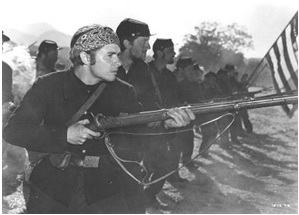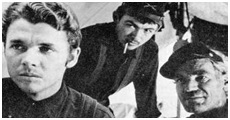|
 |
|
 |
|
|
||
The Red Badge of Courage - Success and Ethics
The Red Badge of Courage (1895)
Written by the American, Stephen Crane (1871-1900), pictured right.
Set in... The Battle of Chancellorsville (1863) during the American Civil War The two opposing sides were the:
Fun facts
Key characters Henry Fleming, young private in the Union army Jim Conklin and Wilson, his fellow soldiers and friends The tattered soldier, an injured soldier The story Private Henry Fleming’s regiment of the Union army defeats the Confederates’ first charge. Terrified, he can’t run away (because he’s boxed in by his fellow soldiers) and he fires mindlessly and mechanically. But, faced by another charge, he flees into the surrounding countryside with some of his fellow soldiers. After an initial feeling that the remaining fighters are fools, he is ashamed of his cowardice after:
Shaken, he wanders through a forest and runs away after seeing a soldier’s decaying corpse. He then joins some wounded soldiers, of whom he is deeply envious, because he thinks that a wound is like
“a red badge of courage”. He meets a twice shot, tattered soldier (pictured right) who:
This forces Henry to move away, and he eventually sees his fellow solder and friend, Jim Conklin, who is badly wounded. Henry promises to take care of him, but he dies with Henry and the tattered (and dying) soldier who continues to enquire about Henry’s wound. Unable to bear his questioning, Henry abandons him to die in the forest. He is close enough to the battlefield to watch some of the fighting. He tries to stop some retreating soldiers
to find out what is happening, but one of them gashes Henry’s head with a rifle. After returning to his regiment,
his friend, Wilson, thinks he has been shot and cares for him. The next day, the regiment goes into battle. Enraged by Jim Conklin’s death, Henry fights bravely and then leads a charge carrying the regimental flag. This prompts his commanders, a colonel and lieutenant, to say that he and Wilson are the best soldiers in the regiment. Henry again carries the flag in a victorious charge. Wilson takes the enemy flag and four prisoners are captured. Henry briefly remembers his cowardice the previous day and his abandonment of the dying tattered man. But his guilt disappears when he thinks of his bravery through “the red sickness” of battle. He is now able to look forward to peacetime with quiet pride and contentment.
Lessons for success and ethics
1. Self-respect through self-sacrifice Henry learns the importance of courage and duty taught by his mother. This gives him his self-respect back after the shame of his cowardice.
2. Listen to your conscience The tattered soldier’s constant nagging is Henry’s conscience. 3. You can’t do everything on your own The regiment’s success in battle is a team effort with soldiers (like Henry) fighting individually but co-operating well with each other. Henry is pictured right with another soldier (Bill Maudlin) in the film.
4. Nobody is perfect Like everybody else, he has:
5. Never stop learning Henry learns from his:
6. Empowerment and self-belief are important At first Henry fights mechanically and mindlessly, feeling part of a big military machine and becoming: “not a man but a member”. He is much more courageous and self-confident when he discovers his own:
He takes responsibility for his own actions rather than relying on other people to tell him what to do. Henry is pictured right in battle in the film.
7. Humility is vital Wilson discovers quiet self-belief and resolve from recognizing his: a) life’s relative insignificance b) vulnerability (prompting him to give Henry a letter for his family if he should die). Henry, too, learns humility from realizing that:
8. Adversity can be advantageous Despite its horrors, war makes Henry and Wilson:
9. Be a principled pragmatist Jim Conklin has principles ,particularly
But he also pragmatically changes his principles according to different
circumstances. He tells Henry that he would:
Henry is pictured right with two other soldiers in the film before going into battle. Key quotes on ethics and integrity He wished that he, too, had a wound, a red badge of honour. A serious prophet upon predicting a flood should be the first to climb a tree, Henry (justifying his cowardice)
Key quotes on war He turned now with a lover’s thirst to images of tranquil skies, fresh meadows, cool brooks – an existence of soft and eternal peace (on Henry leaving the battle) It was a woman, red and white, hating and loving, that called him with the voice of his hopes (on Henry and the regimental flag)
Key quotes on teamwork He became not a man but a member ... He was welded into a common personality which was dominated by a single desire (on Henry’s automatic rifle firing)
Two literature websites to recommend 1. sparknotes.com 2. litcharts.com |
|
|
||
|
|
||
| Copyright © wisdomtowin.com 2025 All Rights Reserved | ||
|




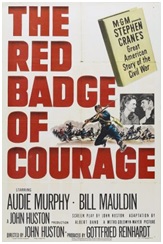
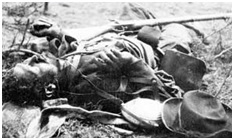
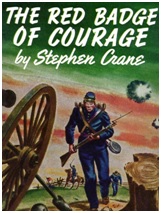
-with-fellow-soldier-bill-maudlin-51film.jpg)

